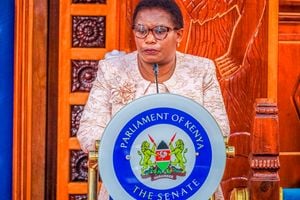
Meru Governor Kawira Mwangaza when she appeared before the Senate Committee on County Public Accounts on July 9, 2024.
Meru County Governor Kawira Mwangaza is fighting to retain her seat, while the Senate is rooting for the setting aside of court orders that suspended its decision to remove her from office.
On Monday, Ms Mwangaza fought spiritedly before Justice Bahati Mwamuye, saying the Meru County Assembly violated a court order stopping it from impeaching her.
She simultaneously said the Senate went ahead and upheld a decision arising from a process that had been stopped by the High Court.
Ms Mwangaza, through her lawyer Elias Mutuma, urged Justice Mwamuye to extend orders suspending her ouster pending the hearing and determination of her case challenging the impeachment.
But the Senate was of a contrary opinion, saying its decision to impeach her should prevail.
"Until the hearing and determination of this case, the governor stands impeached and the decision of the Senate can only be invalidated after the case is determined," Justice Mwamuye heard.
The judge was informed that the Senate's standing orders were still in force that the governor stands impeached.
"Your lordship, you are being misled by the petitioners on the conservatory orders. The governor's term is not indefinite; it's limited to five years and can be stopped through a legal process. We urge you to vacate the conservatory orders issued earlier suspending her impeachment", the Senate argued.
In a rebuttal, Mr Mutuma and Edgar Busiega said the Senate has no legal mandate to change the will of the people who voted for her during the 2022 general elections.
"Kawira Mwangaza is the choice of the voters and should be allowed to serve her term in full," the lawyers argued.
In her petition, Mwangaza said the Senate failed to appreciate the mischief that the county had brought against her in the impeachment motion.
"We urge you to consider declaring Section 33 of the County Government Act unconstitutional for violating Article 50 of the Constitution", Mr Mutuma said.
He said the law states that no person shall be tried for an offence he or she had been tried before and acquitted.
In the impeachment petition against Ms Mwangaza, the court was told that similar charges were brought against her and the Senate failed to appreciate that they were similar.
"Every accused has a right to have a dispute resolved by an independent and partial Tribunal. Her rights were violated. She was not given a fair hearing, the environment was not conducive and the decision had already been determined before she was heard.”
The judge was urged to interrogate what transpired at the senate.
Mr Mutuma said if the orders are not granted, the deputy governor might be sworn in and bring about changes in the county government of Meru.
"We are not asking you to install, but asking you to allow the situation to be the way it is and allow the governor to continue with her services to the Meru people until this case is heard and determined," Mr Mutuma said.
Justice Mwamuye extended the orders suspending the decision to impeach Ms Mwangaza. He further directed parties to appear in court on October 15 to fix a ruling date.
In August, Judge Mwamuye stopped the implementation of the resolution of the Senate, removing her from office.
Mwangaza, through her lawyers, challenged her ouster, arguing that the senators debated her removal, yet she had obtained a court order, stopping her impeachment process.
She also challenged the process, arguing that it was done on a day that was not gazetted as a sitting of the Senate in contravention of the House constitutional mandate.
The embattled Meru governor also argued that the resolution for her removal was founded on grounds that lacked the legally established threshold for the removal of a governor.
Ms Mwangaza argued that the Senate allowed the reintroduction of the same charges as those that the Senate had found to have been unconfirmed in the previous motion of 2023 without interrogating the evidence.
She explained to the court that those issues that the Senate voted on are matters that are still pending determination in court following the first impeachment motion last year.
"There has been an urgency to remove me from the office and install another person, which may be done hurriedly to frustrate me. That's why this application should be heard urgently," she said.
"The manner of the voting and entire consideration of the impeachment motion by the Senate raises further legal concerns and taints the validity of the resolution, as it records the highest number of abstained votes, having 14 members who protested against the vote for lack of an opportunity to debate the motion," she said through her advocate.
She also took issue with the voting on the motion to remove her by impeachment, saying it was done on August 21 at about 12:08 am, on a day which was not gazetted for such a purpose.
In its response, the Senate pointed out that Mwangaza sued the Speaker of the House, Amason Kingi, and left out the House and the lawmakers who voted to uphold her impeachment.
The senators, who sought to join the case, argued that it is only the Senate that could answer the issues raised regarding the proceedings before the House.
The Senate added that the court issued an order with far-reaching consequences that affect its mandate.
The senators said the order issued on August 21, 2024, suspending its decision to remove Kawira from office, violates the principles of natural justice, which provides that parties have a right to be heard before adverse orders are made against them.
Senators endorsed the decision by the Meru County Assembly to send Mwangaza home on the third attempt after 26 members voted in support of the three charges brought against the county boss.








